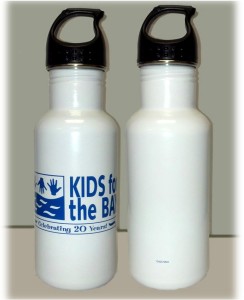 We recently had the pleasure of working with KIDS for the BAY, a nonprofit organization that teaches hands-on, environmental science to children and teachers in elementary schools throughout the San Francisco Bay Area. The group was planning their 20th anniversary celebration and was looking for a water bottle giveaway.
We recently had the pleasure of working with KIDS for the BAY, a nonprofit organization that teaches hands-on, environmental science to children and teachers in elementary schools throughout the San Francisco Bay Area. The group was planning their 20th anniversary celebration and was looking for a water bottle giveaway.
“Being an environmental education organization, it was important to us to choose a giveaway water bottle that was healthy and non-toxic,” said Sheela Shankar, Associate Director of KIDS for the BAY. “In the course of our research and after speaking with Bulletin Bottle, we quickly realized that all metal water bottles are NOT the same!”
Sheela is right—not all water bottles are created equally, which is why we try to learn as much as we can about each client’s specific needs. In the case of KIDS for the BAY, we helped them to understand CPSIA guidelines and age grading, and determined that a water bottle tested for use by children over the age of 3 was ideal. Based on the event date, color needs, and material preference, we suggested the Small Stainless Bolt Bottle. The tracking numbers (mandated by CPSIA) are discrete and don’t detract from the messaging, and KIDS for the BAY can feel confident that their giveaway water bottles are safe for anyone who uses them!
“We ultimately chose Bulletin Bottle’s Small Stainless Bolt Bottle because it is made from food-grade stainless steel. We also chose the bottle because it is classified as child-safe. Although most of our bottles were given to adults, we felt that choosing a child-safe bottle would help ensure the safest type of bottle for all users–including adults,” Sheela said.
So, how does an environmental education organization celebrate its 20-year anniversary? By doing something for the Earth! On October 20, 2012, teachers, families, donors, board members and other supporters joined together to plant native plants beside East Bay’s Codornices Creek, and to celebrate KIDS for the BAY’s twenty years of successful environmental education programs. During that time, over 60,000 school students and 2,650 teachers have graduated from a KIDS for the BAY program!
We are proud to have been a part of this wonderful program’s celebration. Thank you for all you do to teach others to care for our environment!
FMI, visit www.kidsforthebay.org or www.facebook.com/KIDSfortheBAY
